Leonard Splaine Air Conditioner Repair Near Me
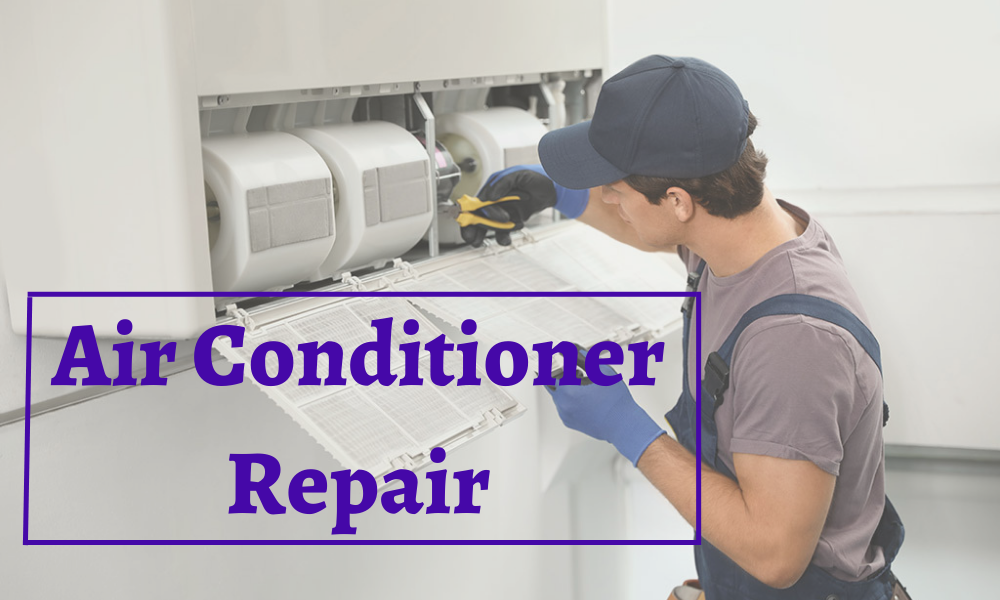
Air Conditioners & Summer Comfort & Health
Summer is here again, and now is the perfect time for the air conditioners to work their magic as they do each year. Air conditioners, which were previously neglected, are now again the major topic of discussion, and any issue with them can simply not be tolerated. That’s when you’ll be searching Google for “Air Conditioner Repair Near Me”.
While having a functional furnace or heating system in our residences or places of business is essential, we may not have realized how important having a working air conditioner is too. For most people, having a central air conditioner is a matter of comfort during hot, humid summer months. While, for others, especially the elderly, it can be a matter of health safety. Some studies have shown that extreme heat and humidity can increase the risk of heart attacks. Regardless of why, one should have a working air conditioner.
Like all electric appliances, air conditioners are also prone to having issues after a long dormant period. That is why it is important to find a commercial HVAC professional to give your unit a good checkup before putting them back into use.
In this post, we are going to be talking about some common air conditioner problems but before that let’s take a quick look at the main components of an air conditioner and how an air conditioner really works.
How Air Conditioners Work
The air conditioning process, in its most basic form, comprises two simultaneous operations that take place both inside and outside the house.
- Indoor: Warm interior air is cooled as it passes over a cold cooling coil that is filled with refrigerant within the house, which is frequently referred to as the “cold side” of the system. As the refrigerant transforms from liquid to gas, heat from the interior air is absorbed into it. The cooled air is returned to the home.
- Outdoor: The refrigerant gas is compressed before entering a large coil in the outdoor unit, which is frequently referred to as the “hot side” of the system, this is seen outside the house. A big fan draws outside air through the exterior coil, rejecting the heat that was absorbed from the home, causing heat to be expelled outside as the refrigerant transforms back into a liquid. The result is a continuous cycle of heat and humidity being removed from indoor air, cool air returning to the home, and heat and humidity exiting the home.
The Main Parts of an Air Conditioner
The major parts of an air conditioner manage refrigerant and move air in two the directions: indoors and outside:
- Evaporator – Receives the liquid refrigerant.
- Condenser – Facilitates heat transfer
- Expansion valve – regulates refrigerant flow into the evaporator
- Compressor – A pump that pressurizes refrigerant
The cold side of an air conditioner contains the evaporator and a fan that blows air over the chilled coils and into the room. The hot side contains the compressor, condenser and another fan to vent hot air coming off the compressed refrigerant to the outdoors. In between the two sets of coils, there’s an expansion valve. It regulates the amount of compressed liquid refrigerant moving into the evaporator. Once in the evaporator, the refrigerant experiences a pressure drop, expands and changes back into a gas. The compressor is actually a large electric pump that pressurizes the refrigerant gas as part of the process of turning it back into a liquid. There are some additional sensors, timers and valves, but the evaporator, compressor, condenser and expansion valve are the main components of an air conditioner.
Now that we know how an air conditioner basically works and the main component of an air conditioner that controls its operation, let’s dive into the common problems of air conditioners and why you actual need a HVAC professional to get them fixed.
15 Air Conditioner Problems
During the year, your air conditioning system accumulates dust and dirt, making it less efficient and costing you additional money in utility bills.
Industry experts are forecasting that energy prices are going to skyrocket in the months ahead. Electric power rates have already risen this year and are expected to continue to rise in the future. A precision inspection and cleaning helps your HVAC run more efficiently and use less energy…saving you money.
Understandably, when it comes to repairs, maintenance and renovations, you want to make sure that you are putting your home and equipment into trusted hands, which is why we have taken the time out to pick the top air conditioning service providers across Northern Virginia who offer timely, efficient and cost-effective air conditioning services all year round.
Keep in mind that not all problems with air conditioning systems qualify as emergencies. There are occasions when a simple system modification, cleaning, or small repair may solve the issue. It’s never a pleasant day when your air conditioner breaks down and you have to contact a service expert for repair work, but the sooner you call, the sooner you’ll go back to enjoying cool comfort. Here are 15 common air conditioner problems you may experience as a homeowner.
1. AC Water Leak (Indoors)
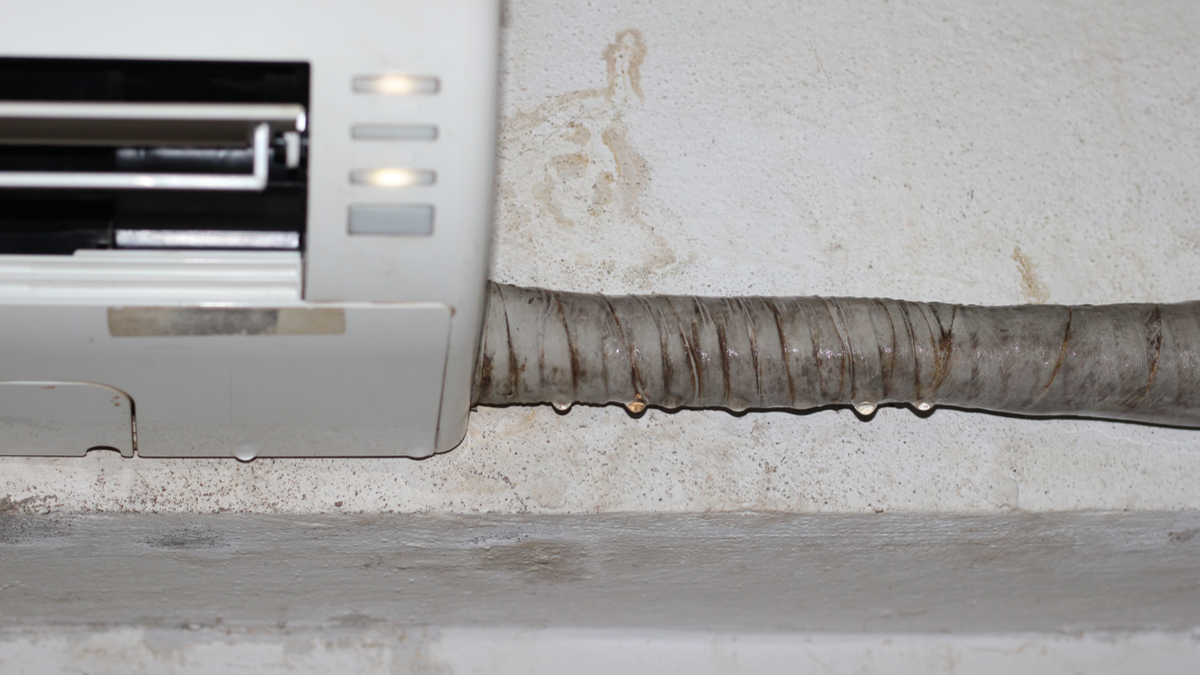
Your air conditioner needs repair if you notice water leaking from the inside unit. Water leaks from an air conditioner may occur because the system’s condensate drain becomes clogged by algae or fungus, which then causes the water to back up the pipe and into your home. Your condensate pump may have fully failed and has to be replaced, which is another potential cause of this AC issue.
Solution to water leaking indoors:
One of the most frequent issues with air conditioners is a water leak, which may be rectified by a specialist or even at home using a do-it-yourself method. A wet or dry vacuum can be used to clear the blocked condensate line. To destroy fungal or algae build-up, you may also pour 6 ounces of vinegar down the drain line. Consult the user handbook in advance to determine the exact placement of the drain pipe in your machine.
2. AC Water Leak (Outdoors)
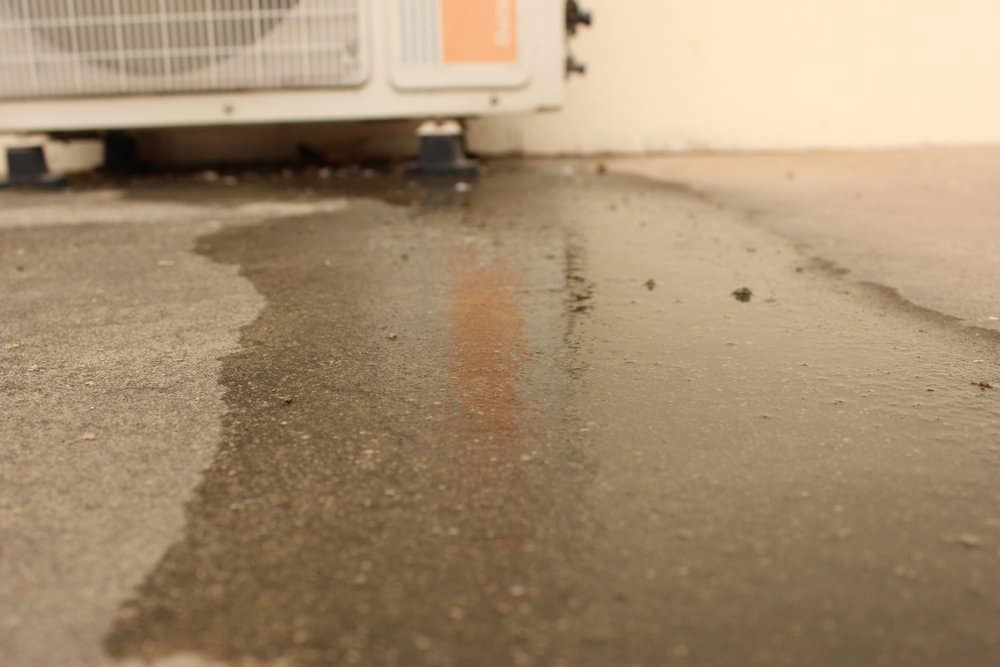
On steamy summer days, you could see a pool of water outside your home, directly beneath the air conditioner’s compressor. There are a number of potential causes for this, including a dry air filter, a damaged condensate pan, a defective AC seal, poor installation, etc.
Solution to water leaking outdoors:
You should first switch off your air conditioner and unplug the power supply after identifying the cause of this AC problem. If this issue is not resolved right away, things might get complicated. You might need to contact a specialist for this kind of air conditioner issue.
3. AC Refrigerant Leak
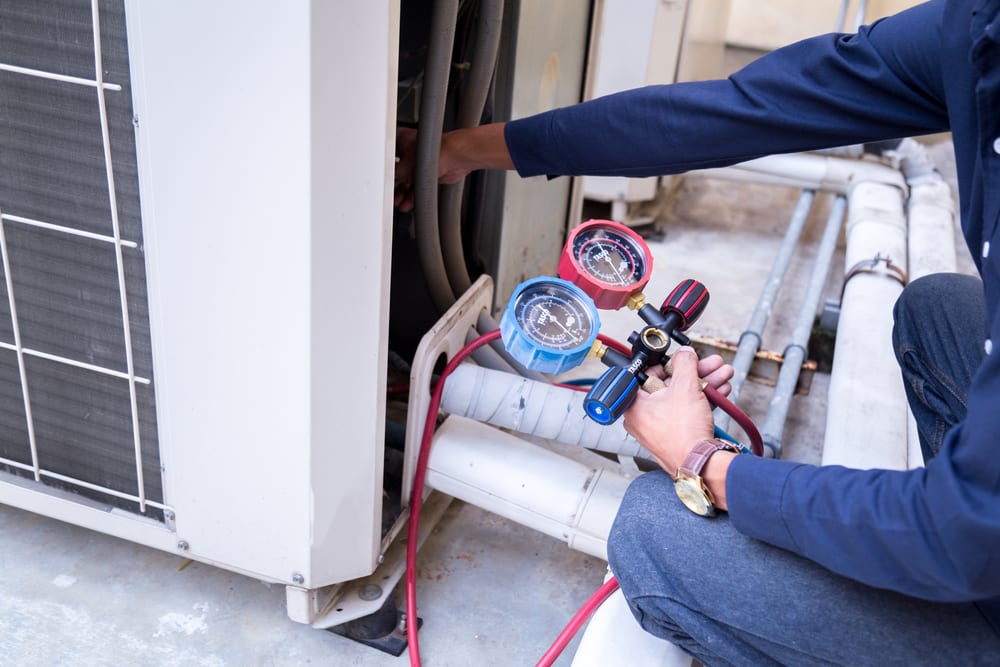
Freon, another name for AC refrigerant, is what cools the air inside of your air conditioner. As the name implies, it is the exact method by which an air conditioner cools your house. One of the most frequent issues with AC units is a refrigerant leak, which can lower the performance of your air conditioner. Additionally, leaks may impact the immediate surroundings.
Solution for AC refrigerant leak:
Multiple methods of detection may be used at home to find the leak. As soon as the problem with the air conditioner is discovered, examine it and take the required steps to fix the leak. To prevent more AC issues, quickly call a professional and get the leak addressed.
Dirty AC Filter
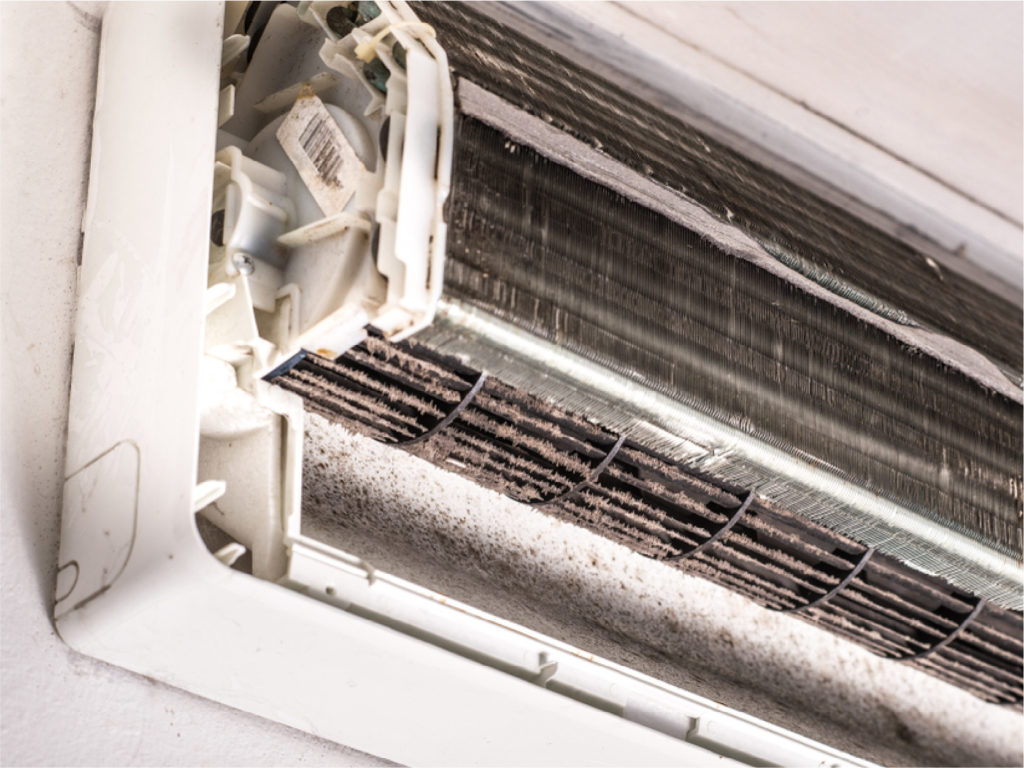
In order to maintain the airflow clean and free of dust and pollutants, an air conditioner filter is crucial. Your air conditioning system’s effectiveness is reduced by a blocked air filter because it inhibits airflow. Additionally, a filthy filter hinders the system’s capacity to adequately chill the air.
Solution for a dirty AC filter:
If the airflow from your air conditioner seems stuffy or congested, check the air filter and give it a cleaning as it is likely that the filthy air filter that is preventing the airflow. Owners of pets should take additional precautions when it comes to their air filters since pet hair requires more frequent replacement.
During the busiest times of the year when air conditioning is used most often, you should clean your filter every two weeks and replace it every two months. You can monitor the filter state of your system with the use of intelligent AC controllers. When it’s time to clean the air filter, they might send out a warning.
5. Damaged Compressor
The compressor, which aids refrigerants in conducting heat exchange and controls the AC pressure, is one of the essential parts of an air conditioner. Failure of the AC compressor can be caused by dirty coils, fluctuations in refrigerant levels, and a lack of lubrication.
The compressor will get overheated and cease running if there is not enough refrigerant. If there is more than is necessary, the extra refrigerant will increase the pressure inside the appliance, which might possibly cause it to malfunction.
Solution for a damaged compressor:
If your air conditioner is not cooling properly or detects a weak HVAC airflow, it is likely a compressor problem. Contact your local air conditioning service to solve this common AC problem. If there is severe damage, it is better to replace the compressor instead of performing air conditioning repair.
6. Frozen Evaporator Coil
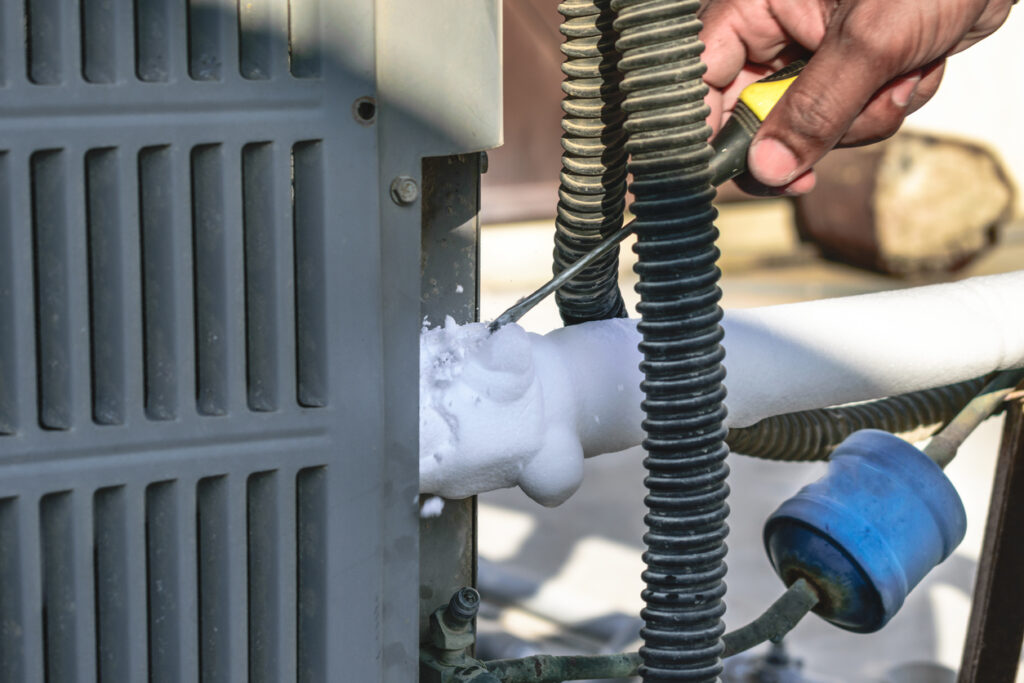
A frozen evaporator coil may be the cause of your air conditioner’s ineffective cooling. It is a frequent issue with residential air conditioners and happens when junk buildup prevents your unit from receiving enough air to function effectively.
Warm air cannot reach the refrigerant because of airflow restrictions caused by dirt that has formed on the coils. Any moisture on the coils freezes in this situation because the refrigerant gets too cold.
The coil becomes encrusted in ice over time, which stops the refrigerant from the coil from collecting latent heat. Your home’s air conditioning won’t run smoothly because of this AC issue.
Solution for a frozen evaporator coil:
First, examine the damage to determine the cause of this issue. Finally, let the evaporator coil to thaw (defrost). By not using the device, you can achieve this. Make sure you first turn off the electricity. Normally, it takes 24 hours for the evaporator coil to defrost entirely. By using a hairdryer, you can hasten the process. Be mindful not to overheat the coil, though. Maintain fan mode on your system if there is mild ice since the blower fan will remove the frost without shutting the system down.
7. Capacitor Failure
A capacitor problem may occasionally be indicated by your air conditioner’s sudden on and off cycles and clicking noise. A capacitor is a crucial component of your air conditioner and is in charge of providing the motor with the first boost it needs to begin operating.
The capacitor may overheat during the sweltering summer months when your AC is operating at full capacity. Additionally, your capacitor might be harmed by power sags and frequent thermostat adjustments.
Solution for capacitor failure:
Contact a professional to get your capacitor checked. Unfortunately, you cannot repair or replace it on your own as there is a risk of an electric shock.
8. Thermostat Malfunctioning
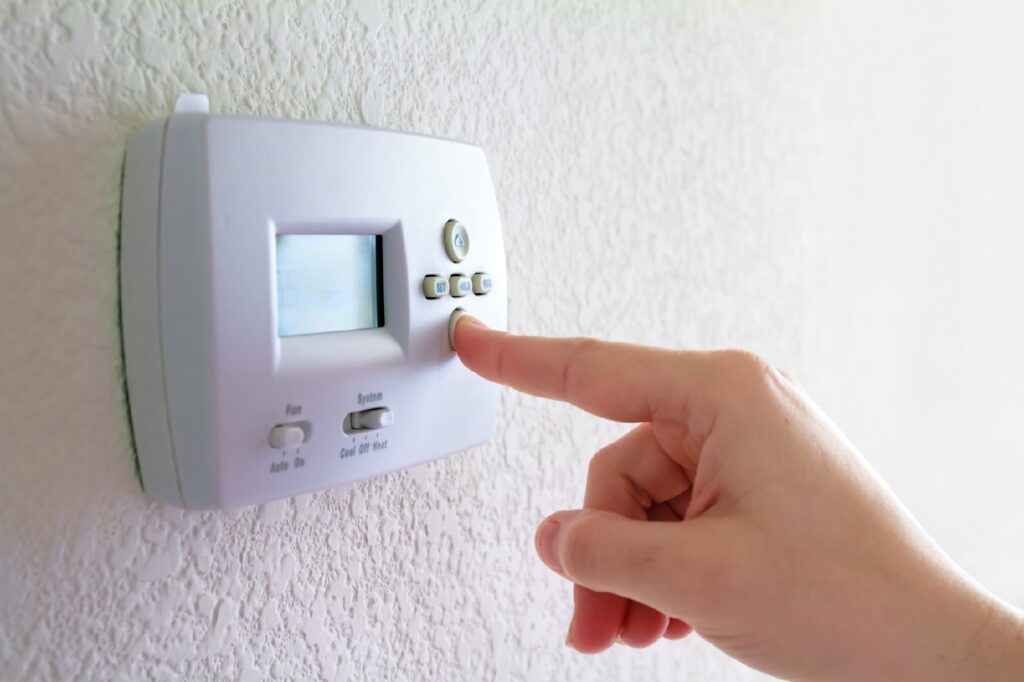
One of the most common problems with home air conditioners is the thermostat malfunctioning. For example, if your air conditioner is short cycling and your space feels warmer than usual, a faulty thermostat is to be blamed.
There might be a serious issue due to dust and corrosion build-up or a simple case of dead batteries. Loose screws or wires inside the thermostat can also affect its functioning. If you have placed your thermostat where it gets direct sunlight, it can also impact its reading. Another reason that your thermostat is not working can be due to incorrect calibration.
Solution for a faulty thermostat:
Check the batteries in your battery-operated thermostat to make sure they are in good condition. Remove the lid and use a soft brush to clean any debris to prevent dirt buildup. Contact a professional if you see rust buildup since attempting to clean it yourself might result in more harm. Check your thermostat’s placement as well; it is advised to put it in a room you use regularly and transfer it to a shady spot.
Take a glass thermometer and position it next to your thermostat to verify the calibration. Check the readings of both devices after 15 minutes. It’s time to adjust your thermostat if there is a difference of greater than one degree. You can eliminate the problems with your old thermostat by switching to a smart thermostat. You can set it according to your preference and you can control it using your phone. A smart thermostat also helps in saving electricity bills.
9. AC Making Noises
If you notice strange, loud AC noises coming from your unit, then it signals a problem. They seem annoying, but they help you figure out what’s wrong with your system before this AC issue gets worse.
Different noises indicate a different AC problem – for example, a grinding sound points toward the compressor or motor failure. If there is an obstruction in the AC fan or a capacitor issue, it will make clicking noises. A bubbling noise is produced due to a refrigerant leak or excess moisture in your unit.
Solution for AC noises:
You should never ignore the AC noise issue and contact an HVAC professional immediately. A technician will help you figure out what the sound means and fix the underlying issue.
10. Circuit Breaker Keeps Tripping
If your circuit breaker continues tripping, there might be a number of problems causing it, such as a power surge, a capacitor failure, a filthy filter or coils, low refrigerant levels, a compressor failure, or even problems with the circuit breaker itself.
As soon as you detect this issue, turn off the air conditioning and avoid trying to reset the breaker because doing so might start a fire.
Solution to tripping circuit breaker
Unfortunately, there is no DIY solution for this problem. You would have to contact a professional as a circuit breaker involves electrical components and can get dangerous.
11. AC Smells Bad

A pungent smell from your air conditioner is due to mold growth. A fire-like smell indicates that some electrical components are burning inside the system. A gas smell indicates leakage of Methyl Mercaptan, which can be dangerous.
If you turn on the AC after a while, you may notice a rotten egg smell coming from the unit. Birds and insects can get into your system and die, causing this weird smell.
Solution for AC bad odor:
Thoroughly clean your air conditioner when taking it out after a dormant period. For electrical issues and gas leakage issues, always call a professional for repairs.
12. Leaking Ducts
When using ducted air conditioners, ductwork is in charge of distributing the chilly air throughout the entire home. However, if there is a leak or a hole, it could impair the operation of your air conditioner. You would think that your air conditioner was not even switched on, even if it had been operating for some time.
The air quality can be impacted by leaking ducts because the gaps in the ducting can draw in dust and other contaminants. In addition to clogging air filters, this extra waste can cause inconsistent heating and cooling in your home.
Solution for leaking ducts:
To determine this common air conditioner problem, first look for holes and tears in the ductwork. If you can’t find the holes, you can turn on your air conditioning unit at full speed to check for airflow through holes; however, this will only work if your unit is blowing air. Most leaks occur where the two ducts are joined, so place your hand near these joints to feel air coming out.
After finding the leaks, use foil-faced tape to seal them. But tape isn’t a long-term solution, so it’s better to use a mastic air duct sealant. It is a sticky substance that you apply to the holes and gaps, and it hardens after drying. If you aren’t sure you will do it right, contact an HVAC expert to help you out.
13. Failure of Electric Control
When you use your air conditioner frequently enough, the compressor and fan might eventually become worn out. A connection is made to start the unit between the blower, condenser, and compressor motors. The compressor and motor may not turn on if there is a break in the connection caused by wire or terminal corrosion. Electrical failure can also be caused by power surges.
Electrical failure might result in acid buildup in your unit, which leads to more air conditioner issues.
Solution for a failure in electric control:
To determine this air condoning unit problem, check the electrical connection, and if you cannot resolve the issue, seek a professional’s help.
A professional can detect the acid build-up during tune-ups as it is a major sign of an electrical issue. Regular AC maintenance can help prevent this in the future.
14. AC Fan Failure
Through a fan housed inside the outside unit, an air conditioner moves heat from interior to outdoors. The appropriate transmission of heat is prevented if the fan outside the home is not operating effectively. The compressor of the air conditioner can overheat as a result, tripping the safety load. The worst-case scenario is when it might harm the compressor inside, necessitating the replacement of an air conditioner.
Solution for AC fan failure:
If your system’s fan stops working, there may be a problem with the wiring or a loose component someplace. Simply take off the outer casing in these situations to physically evaluate the issue. Again, make sure you cut off the electricity first. The majority of the time, however, it could be challenging for you to identify such an air conditioning unit issue, therefore it is preferable to call a professional and get it serviced correctly.
15. Weak Airflow
There is a problem with the HVAC airflow if you detect pressure imbalances or draughts in your house that are both hot and cold. In this case, the fan is unable to pump enough air due to a variety of factors, including a clogged air filter or a broken blower motor.
This problem can also be brought on by leaking ducts, blocked vents, and low refrigerant levels. It is a bothersome issue, especially during the sweltering summertime.
Solution for weak airflow:
Try recalibrating a broken thermostat to see if it fixes it. Verify whether a piece of furniture or a decorative object is obstructing the airflow to rule out vent obstruction. To solve the issue, just push it away.
Always seek the assistance of a skilled specialist because it can occasionally be challenging to identify the precise problem.
Need a New Air Conditioner? Here are Our Top Picks for 2023
If your current Aair conditioner has cooled its last room and its time to replace it or if you are opting to install an contral air conditioning to replace window or a portable units, here are our top picks for both energy efficiency abd value for money.

Top Lennox Air Conditioners
Lennox air conditioners are renowned for their performance and dependability when it comes to providing comfort during the summer months. Homeowners tend to prioritize functionality over aesthetics when it comes to selecting an air conditioner, rather than opting for one based on its looks.
Below We’ve compiled a list of the top Lennox Air conditioners to help you make an informed decision when it comes to time to install or replace your home’s AC unit.
If you want to get the highest quality AC, many believe the Lennox XC25 air conditioner is the top of the line Lennox unit. It is incredibly quiet, with practically no noise. If you are looking to save on energy costs, this model is designed with precision temperature and inverter technology that is highly efficient. And for your added assurance, it comes with a 10-year limited warranty that covers the compressor and other components.
If you’re on the hunt for a system that can conform to your particular requirements, the Lennox XC20 air conditioner is the perfect option. This system is especially great for its variable-capacity operation that allows you to adjust temperature levels based on your energy consumption. The variable speed capacity shifts with changes in the outdoor temperature and house demand, leaving you with a consistently comfortable environment.
Moreover, the Lennox XC20 can help you save some money too. It is designed to run at a speed that satisfies your set temperature, without using an excessive amount of energy. It also includes a 10-year limited warranty on parts and compressors, so you don’t have to worry about any issues arising.
The Lennox XC21 air conditioner is designed to be extremely quiet, boasting the Silent Comfort technology, with thick insulation and vibration resistance, as well as a uniquely designed fan blade for minimal noise. Along with its efficiency and long-lasting engineering, the Lennox XC21 also has a 10-year limited warranty on the compressor and parts.
Take a deep breath of satisfaction as you come into your lovely, comfortably cooled house on a sultry summer evening, all thanks to the Lennox SL18XC1 air conditioner. This model is designed with the Silent Comfort fan motor, which augments efficiency and reduces noise. Not only that, it is also well-known for its durability, making it the most long-lasting Lennox air conditioner. You get a 10-year limited warranty for its parts and compressors.
No matter the climate, the Lennox XC16 air conditioner is equipped to provide complete coverage. Its two-stage system works in a clever way, running at its most efficient level to save energy. When the temperature rises, the AC can increase its cooling capacity to the higher second stage.
This intuitive AC is ideal for those wanting to maintain peak comfort. It also comes with a 10-year warranty on parts and compressors.

Top Trane air conditioner
Trane air conditioners are some of the best in the industry, and you will have a variety of options to choose from when the time to buy arrives. If you are considering buying a Trane air conditioner, we’ve decided to make your job easier by selecting the top three.
Most Efficient – Trane XV20i
Wouldn’t it be great to have an air conditioner that is both excellent and energy-efficient? Well, Trane’s XV20i air conditioner offers just that! It has the highest energy efficiency rating (22 SEER) of all Trane products, resulting in up to 64% energy savings each year. Plus, the XV20i comes with TruComfort variable-speed system, so you can keep your home at the optimal temperature without experiencing any spikes in energy consumption.
Quietest – Trane XV18
If you’re looking for a peaceful and tranquil atmosphere, you should consider the XV18 air conditioner. Boasting a superior sound level of 57 dBA, it is 4 dB quieter than its competitors. This silent performance is achieved through the use of advanced sound insulators and an integrated fan system that incorporates a blade-down fan design to minimize sound and maximize airflow. Additionally, the unit is Energy Star Qualified with a SEER rating of 18.
Best Value – Trane XR14
If you’re looking for a peaceful and tranquil atmosphere, you should consider the XV18 air conditioner. Boasting a superior sound level of 57 dBA, it is 4 dB quieter than its competitors. This silent performance is achieved through the use of advanced sound insulators and an integrated fan system that incorporates a blade-down fan design to minimize sound and maximize airflow. Additionally, the unit is Energy Star Qualified with a SEER rating of 18.
Need an AC Repair Expert Near You?
Our contact us page makes it easy for you to get in touch with our our A+, licensed, and insured HVAC specialists. We can visit your home or business and inspect your system so that any problem areas can be identified. Our pricing and rates are fair and made with integrity. We have the experience to make repairs and get the cold air flowing again. Contact us today!
